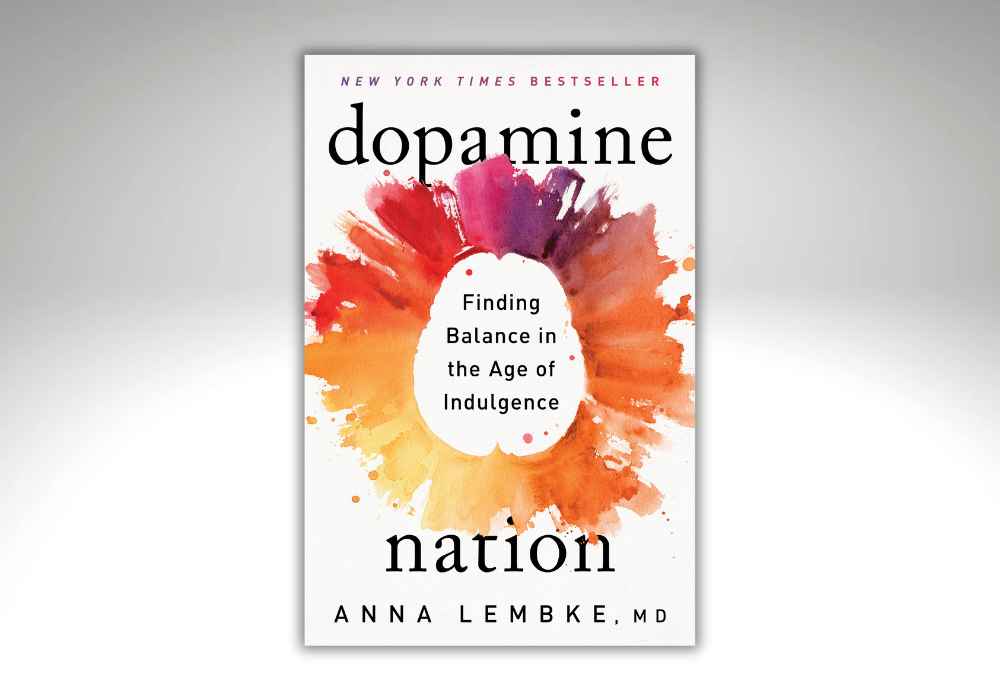This post was last updated on December 4th, 2024 at 05:14 pm
One of the first things I learned from Dr. Anna Lembke’s book, “Dopamine Nation: Finding Balance in the Age of Indulgence,” is that our nation’s addiction problems are largely the result of having too much of, well, everything. We have a “drugified” culture fueled by technological advances, and the smartphone is the “modern-day hypodermic needle delivering digital dopamine 24/7 for a wired generation,” Dr. Lembke writes. Without having to leave their homes, people can consume anything they want, whenever they want, and do it to excess.
The title of her book refers to the neurotransmitters in our brain called dopamine, which produce pleasurable feelings. These feelings aren’t bad in themselves. The problem is that too many people have become fixated on those activities and substances that release the most dopamine. Kids and adults alike are becoming addicted. It’s a scary situation, especially for parents seeking to teach their children how to lead a life of moderation.
I recently reached out to Dr. Lembke because I wanted her advice for parents on navigating this “drugified” culture. How can we help our kids avoid developing addictions?
Dr. Lembke is well qualified to address this topic. She maintains a clinical practice and has published many peer-reviewed papers about addiction. Along with writing “Dopamine Nation,” she has multiple roles at Stanford Medicine, including serving as the medical director of Stanford Addiction Medicine.
Talk to kids about addiction
Dr. Lembke is also a mother. She believes talking with kids about addiction helps to protect them. During my interview with her, Dr. Lembke explained how she’s open with her kids about some of her own battles with digital media. “I talk a lot with my kids about how I struggle with YouTube videos, especially in the evenings when I’m tired,” she told me.
While some topics, such as pornography, can be difficult to discuss, it’s important not to avoid them. “Those conversations aren’t entirely comfortable for me either,” she said, “but I’d rather have them than not have them because I know the behavior is happening.”
‘Digital media are a drug’
Because digital media can be dangerous, Dr. Lembke recommends parents delay giving their children a smartphone. “Digital media are a drug. They are potent reinforcers for our brains,” she said. “So I recommend that kids not have their own personal digital devices really before they go to high school.”
Parents should also be prepared to take away their teen’s device if their teen proves unable to moderate their use. “They’re given it under a certain contractual understanding that if you can handle it and moderate your use, then you can keep it. If not, you can’t,” Dr. Lembke said.
If an addiction develops…
If a child or teen develops an addiction, whether to digital content or another substance, parents will likely notice a change in their behavior. “The way addiction often manifests is sociopathic selfish tendencies,” she said. “The personality really changes, and they’re not thoughtful about people in the family anymore, not doing things in a communal way.”
Interestingly, how well a child performs in school is “no longer a reliable marker” for identifying an addiction problem, Dr. Lembke said. Some kids are able to juggle their addiction and keep up their grades. “It’s much easier now in a lot of schools for a kid to get an ‘A’ in a class that they wouldn’t have been able to get that ‘A,’ say, 20 or 30 or 40 years ago,” she said.
If you suspect your child has developed an addiction, be careful how you bring up the topic. You don’t want to become accusatory or scolding, Dr. Lembke cautioned. Have a discussion with your child but “don’t try to diagnose. Don’t try to tell them what to do. None of that helps,” she said. Rather say something like, “This is what I’m seeing that is concerning.” The goal should be to understand their struggles and not to tell them what to do.

Below are excerpts from my interview with Dr. Lembke. Her responses are mostly verbatim, though some parts have been edited for clarity and length.
Frugalmatic: I’ve always been fascinated with what makes certain addictions socially acceptable and others social taboos. What do you think forces some addictions to be more hidden, while others are allowed to be in the wide open?
Dr. Anna Lembke: I think there are two main factors. The first is, what is the time course of the negative consequences of the addiction? If you have a very rapid acceleration from first onset of use to negative consequences, including potentially death like you do with opioids, then people are much better at seeing cause and effect there. Those types of addictions tend to have a lot more negative stigma associated with them, as well as often laws against using them.
The really big factor, separate from that time of onset to harm, is cultural norms. Almost all stimulants are more socially acceptable because we live in a culture that prioritizes and highly celebrates production. Stimulants help people produce. Whether it’s Adderall, caffeine, nicotine, or what have you, anything that makes people more productive or work more, or at least gives the appearance of working, is going to be more socially acceptable.
For that matter, digital media, the internet, and our devices could fit into that category. We have the experience or sensation that we’re working when we’re on these devices.
And then workaholism is another great example. Our cultural heroes are people like Elon Musk, who are ostensibly workaholics. You have this really interesting intersection between stimulating drugs, workaholism, and the cultural positive evaluation of productive work in a capitalist society.
For more interviews, check out the Frugalmatic archives
F: Since “Dopamine Nation” was printed in 2021, the U.S has seen an explosion in online sports betting. In many states, you can simply place a bet through your smartphone. What are you seeing on this front, in terms of the addiction problem?
AL: This problem gets right to the heart of the access issue. Once sports betting goes online and is available 24/7 to anyone who wants to have it, including minors, you are naturally going to get an explosion in the number of people placing bets and, likewise, an explosion in the number of people dealing with serious pathological gambling problems.
So, I fought a bill to legalize online sports betting in California, and it was voted down, thankfully. But it won’t be long. This is inevitable. Just to see the way NCAA and professional teams are now basically creating business deals together with sports betting conglomerates, it’s so disheartening. It’s actually astounding.
What we see in the states which legalize online sports betting is within a year, there is a 300% to 500% increase in calls to pathological gambler hotlines. And let me tell you pathological gambling is a life-threatening illness. I had a patient from way back who was addicted to sports betting. He had been a successful collegiate athlete. He went on to medical school and had a trust fund to pay for it. He lost it all to online sports betting. He didn’t tell his parents and took out a loan to pay for medical school. He also lost that loan all to sports betting. It was a total tragedy. Then, of course, he was considering suicide.
F: This next question is speculation on my part on whether there’s any connection between a rise in addictive behavior and a rise in more extreme political views and rhetoric. Is there any correlation between this decline in moderation in our political lives and the growing problems our nation faces with addiction? Put another way, is a society that values moderation in the household more likely to value moderation in its politics?
AL: What’s happened with political discourse and discourse broadly, pretty much any topic, is that the medium has become the message. So the medium through which we are now getting our news is highly addictive and sensationalist. Our brains are finding it pleasurable and reinforcing to engage with the medium because we’re probably getting hits of dopamine in our reward pathway not because we’re actually learning anything or solving problems or any of that. Part of what is triggering reward for our brains with this medium, partially because dopamine is very responsive to novelty, is we have this illusion that we’re getting news, that we’re gathering information when we’re not.
Even more importantly, when we experience an emotion at the same time another person is experiencing an emotion, that’s very reinforcing. That’s part of what binds people together in tribes. What’s happened is we’re now going online to experience outrage at the same time somebody else is experiencing outrage because it feels good.
People in this election cycle, they go on and listen to the podcasts that say the things they want to hear because it genuinely feels good. It’s reinforcing. It’s a drug. And then they want more of it, and pretty soon we’re all in our own little silos, separated echo chambers. That’s no way to actually solve problems, have reasonable discourse, and understand another person’s perspective. We’re all just sort of self-stimulating.
F: On a personal note, I’ve recently taken up pickleball, and I really like it and try to play a few times a week. I’ve heard players describe either themselves or others as addicted. Do you know, is there something unique about pickleball that might actually make it more addictive than other sports?
AL: I actually don’t know much about pickleball, but I know enough to make a potential analogy. I’m going to say that tennis is to pickleball as a movie is to TikTok. My sense of pickleball is that it’s taken tennis and made it shorter and quicker. It’s a faster onset, faster offset. That’s essentially why TikTok is so addictive. You have this very fast onset. It doesn’t last that long. Pop, pop, pop. It’s incredibly reinforcing. You have this small, quick stimulus. It’s on and then it’s off again, and you want more.

